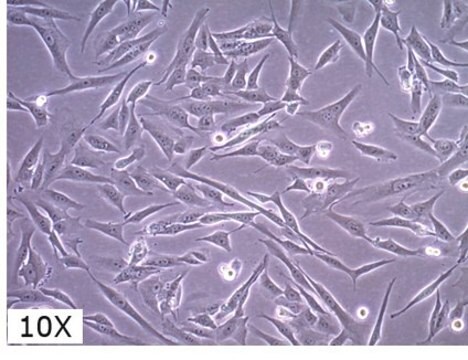SCC289
SF295 Human Glioblastoma Cell Line
SF295 human glioblastoma cell line is a valuable model for glioblastoma research.
Anmeldenzur Ansicht organisationsspezifischer und vertraglich vereinbarter Preise
Alle Fotos(1)
About This Item
UNSPSC-Code:
41106514
NACRES:
NA.45
Empfohlene Produkte
Anwendung(en)
cell analysis
Allgemeine Beschreibung
Glioblastoma multiforme is the most common and malignant primary brain tumor in adults, with a high recurrence rate and a five-year survival rate of less than 5% (1). Nearly 50% of glioblastomas originate in the frontal or temporal lobes of the brain (1). Glioblastomas are the most aggressive form of cancer and demonstrate a high degree of chemotherapy resistance, highlighting the importance of relevant human patient-derived cell models for advancing research into characteristics and treatment of this disease.
SF295 is a patient-derived glioblastoma cell line originating from a temporal lobe tumor (2). SF295 cells do not express the glial markers GFAP or glutamine synthetase, but have been shown to positively express neurofibromin-1, identified as one of the most frequently mutated factors in glioblastoma multiforme (3). SF295 cells exhibit hypertriploidy and glial-like morphology in culture and are non-tumorigenic in athymic mice (2). The SF295 cell line is highly published in studies of chemotherapeutic treatments for glioblastoma, representing a valuable cellular model for assessment of drugs and molecular modulators for their effect on glioblastomas.
<bold>Source:</bold>
The SF295 glioblastoma cell line was derived from the left frontal lobe tumor of a 67-year-old female patient (2).
Research Category:
Cancer
SF295 is a patient-derived glioblastoma cell line originating from a temporal lobe tumor (2). SF295 cells do not express the glial markers GFAP or glutamine synthetase, but have been shown to positively express neurofibromin-1, identified as one of the most frequently mutated factors in glioblastoma multiforme (3). SF295 cells exhibit hypertriploidy and glial-like morphology in culture and are non-tumorigenic in athymic mice (2). The SF295 cell line is highly published in studies of chemotherapeutic treatments for glioblastoma, representing a valuable cellular model for assessment of drugs and molecular modulators for their effect on glioblastomas.
<bold>Source:</bold>
The SF295 glioblastoma cell line was derived from the left frontal lobe tumor of a 67-year-old female patient (2).
Research Category:
Cancer
Ursprung der Zelllinie
Human, Cancer Cells
Verpackung
≥1X106 cells/vial
Lagerung und Haltbarkeit
Store in liquid nitrogen. The cells can be cultured for at least 10 passages after initial thawing without significantly affecting the cell marker expression and functionality.
Sonstige Hinweise
This product is intended for sale and sold solely to academic institutions for internal academic research use per the terms of the “Academic Use Agreement” as detailed in the product documentation. For information regarding any other use, please contact licensing@emdmillipore.com.
Haftungsausschluss
Unless otherwise stated in our catalog or other company documentation accompanying the product(s), our products are intended for research use only and are not to be used for any other purpose, which includes but is not limited to, unauthorized commercial uses, in vitro diagnostic uses, ex vivo or in vivo therapeutic uses or any type of consumption or application to humans or animals.
Lagerklassenschlüssel
10 - Combustible liquids
WGK
WGK 1
Flammpunkt (°F)
212.0 °F
Flammpunkt (°C)
100 °C
Analysenzertifikate (COA)
Suchen Sie nach Analysenzertifikate (COA), indem Sie die Lot-/Chargennummer des Produkts eingeben. Lot- und Chargennummern sind auf dem Produktetikett hinter den Wörtern ‘Lot’ oder ‘Batch’ (Lot oder Charge) zu finden.
Besitzen Sie dieses Produkt bereits?
In der Dokumentenbibliothek finden Sie die Dokumentation zu den Produkten, die Sie kürzlich erworben haben.
Unser Team von Wissenschaftlern verfügt über Erfahrung in allen Forschungsbereichen einschließlich Life Science, Materialwissenschaften, chemischer Synthese, Chromatographie, Analytik und vielen mehr..
Setzen Sie sich mit dem technischen Dienst in Verbindung.